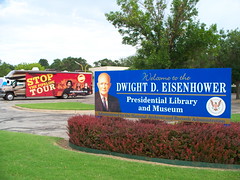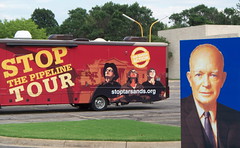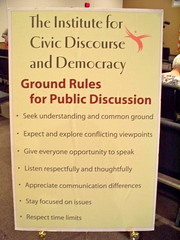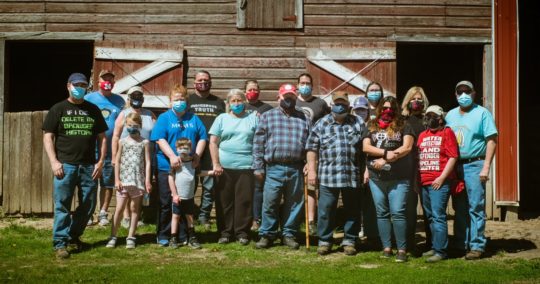Monday, August 22, 2011
Members of the Stop the Pipeline Tour spent Sunday night in a contractor’s campground in Ponca City, Oklahoma, home to a huge Conoco-Phillips refinery. Without a doubt many of the other RV’s parked in the campground were those of oilworkers and refinery employees, and it’s possible some of them may have helped construct the Keystone I pipeline. Needless to say, we got some looks in the campground Monday morning and driving through town in our “Stop the Pipeline” emblazoned bus.
We arrived in Abilene, Kansas a few hours before our scheduled event, which was a debate between David Daniel and Jim Prescott, a TransCanada spokesman. The debate was to be held in the Eisenhower Presidential Library Visitor’s Center, and the large sign with Ike’s picture on it told us we were in the right place. The fact that the debate was held at the Eisenhower library is, I think, significant. Eisenhower made many important decisions during his presidency, but perhaps one of his most enduring legacies is the creation of the Interstate Highway System, which revolutionized transportation in the United States.
The IHS signaled a paradigm shift in our nation’s history. No longer were we a horse-powered culture in which only the wealthy could afford cars. Innovations in automobile manufacturing and the rise of the middle class made us into what we are now: a highly mobile society with a car (or two, or three) in every driveway.
At the same time that the interstate highways launched our nation into the mid-20th century by providing a network of high-speed roadways between major cities, it also locked us into a future of fossil-fuel use by pushing us down the path of individual vehicle transportation and truck freight. Now we are past the first decade of the 21st century and we are seeing the environmental and economic effects of our cars-and-trucks society and its voracious consumption of fuel.
As our world’s oil supply is running out, the low-hanging fruit is gone. We have turned to sources, namely tar sands, that are more difficult to produce and more dangerous to transport. Tar sands oil is not the fuel source of the past, but of the present; it’s up to us to determine whether it will be the fuel of the future.
As the debate began, TransCanada’s Jim Prescott verified this point as he tried to assure the public that tar sands oil is nothing new or dangerous. In fact, he said we are burning this oil in our cars right now, which is true, but is also beside the point. We who are trying to stop the Keystone pipeline are not concerned with the finished product, but with the material that will be flowing through the pipe.
David did a great job of presenting the facts that he had found, either from TransCanada’s own statements and letters to him, or from other letters and documents. Prescott, on the other hand, arrogantly dismissed concerns in typical TransCanada arrogant fashion, without really answering questions directly. In the face of David’s calm concern, Prescott regurgitated tired talking points, attacked the factual nature of his opponent’s remarks (without offering any correction or “proof” to the contrary), and made obnoxious facial expressions that, instead of diminishing David’s arguments, made Prescott look like a fool who had failed the first semester of acting school.
When it came time for public comments, it was clear that Kansans are not happy with TransCanada. From county commissioners upset that TransCanada is not paying taxes in their state, to landowners angry about the property damage caused by the pipeline, to native tribal members (one of whom Prescott rudely interrupted), there weren’t many TransCanada fans among the 150 people in the room.
After the debate we headed to Salina, where we parked the bus in a campground and got some much-needed rest. David was drained from the debate and so were the rest of us. But tomorrow we would be in my home state of Nebraska, where opposition to the pipeline is as strong as it is anywhere, and growing steadily. After three days on the road, I was looking forward to being back in Lincoln and meeting the rest of the folks on the Tar Sands Caravan.






